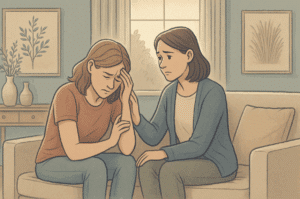Suicide risk is an important thing to understand in any community. However, the topic is especially vital to understand when talking about mental illness. About 50% of people who commit suicide have a mental disorder, and mental illness can significantly increase your risk of suicide.
The causes and reasoning behind suicide are diverse, and every case can be different. However, mental illness can contribute to suicide risk because of increased challenges in coping with daily life, difficult cognitive cycles that can impair reasoning, and isolation from others.
Which Disorders Carry High Risk?
Although it’s easy to say that mental health disorders in general increase suicide risk, it’s important to acknowledge that “mental illness” covers a wide range of challenges and needs. Most studies show that the highest suicide risk is found specifically in mood disorders such as depression and bipolar disorder, as well as behavioral disorders like addiction and anorexia nervosa.
About Medication and Suicide Risk
Many individuals with mental illness also utilize medication to control symptoms. Others are either undiagnosed, or haven’t learned to manage mental illness with proper medication, and so they instead self-medicate using mood-altering substances. In either case, suicide risk is elevated. Part of this is because access to drugs that can be used for suicide increases risk, just as access to a gun increases risk. However, another factor contributing to this risk is the fluctuation in mood. Dark periods of low mood and depression can be dangerous, but sometimes the most dangerous phase is when the patient starts to feel better. Frequent fluctuations increase a patient’s time in the danger zone.
For this reason, it’s vital that use of medication is closely monitored by a professional, and that substance abuse co-occurring with mental illness is carefully handled.
Preventing Suicide
Here at A Mission for Michael, we accommodate patients at any level of care. With extensive experience in the field, and a team of highly specialized clinicians, we help patients to take charge of mental illness and build a foundation for a happy, healthy life. However, suicide can be an ongoing and recurrent risk for those suffering from mental illness, and so it’s important for everyone to be aware of risk factors and understand how to act to intervene when a situation gets dangerous.
Read more about suicide and prevention from the National Alliance on Mental Illness here. And remember that if at any given moment, you or someone you know is in danger, there are many resources that you can call, including the National Suicide Prevention Hotline at 800-273-TALK (8255).







